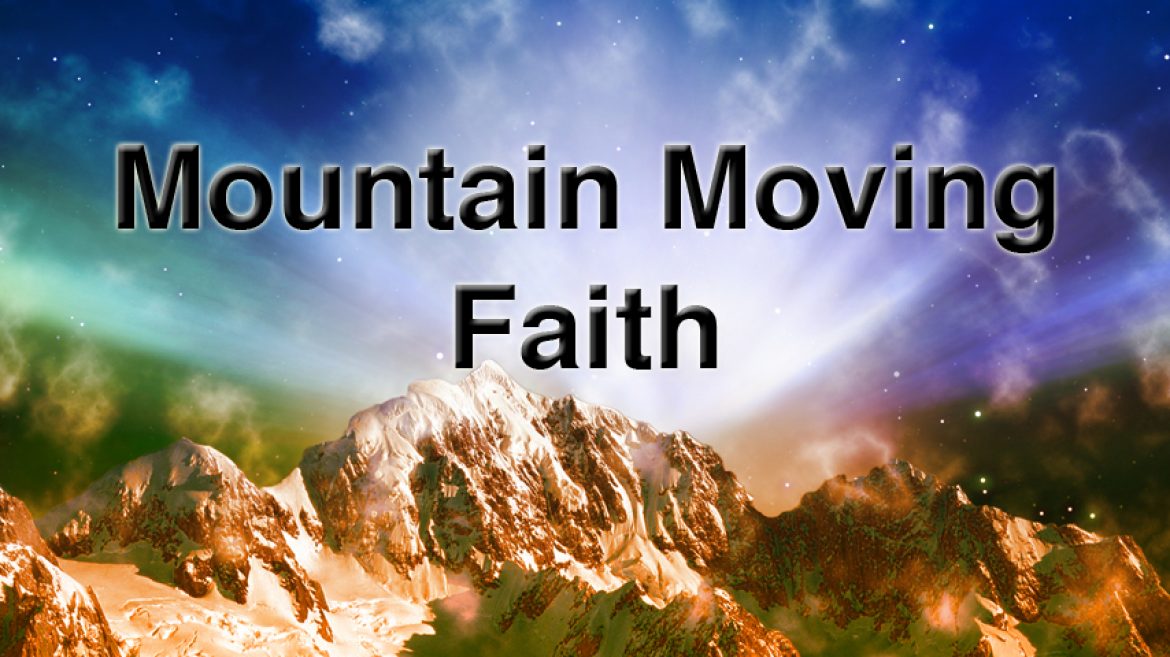
Mountain Moving Faith
Hebrews 10
19 Having therefore, brethren, boldness to enter into the holiest by the blood of Jesus,
20 By a new and living way, which he hath consecrated for us, through the veil, that is to say, his flesh;
21 And having an high priest over the house of God
“Mountain Moving Faith:” Contending for the Faith Once Delivered to the Saints
“Mountain Moving Faith” is the best Biblical description of this ancient faith of the early church. Our Lord of the Church never intended for this faith to be forgotten. Every great awakening has been the emerging of this supernatural faith. There is no question but our Lord wants a fresh visitation of a faith that has no boundary but the Holy Scripture. God never does “new things.” It is always a rediscovering of the foundation of the past. Are you willing to die to yourself to such a total degree that the Resurrected Christ is “All in All?”
Our world is under siege: The kingdom of light versus the kingdom of darkness. Either of these two kingdoms may be reflected in many different ways, but the source is always the same. The King of the Kingdom of Darkness is especially shrewd in disguise and deception and is labeled in the sacred book as “the deceiver.” No generation like the present has witnessed the reflections of evil from so many angles. The New Age Movement is represented in everything from pseudoscience and psychology to occultic surgery and demonic communications (channeling, ESP, etc.).
When we believers are willing to cut through all the crud that could be called advanced theology and get back to the simplicity of truth, the picture is plain indeed. Even more beautiful than the picture, is the beauty of our accomplished victory. One verse in Saint John, Chapter one is adequate: “And the light shineth in darkness and the darkness comprehended it not” (could not master it) (John 1:5). When the light of Jesus Christ is unclouded by the array of our foolish efforts to provide human aid, the power of Christ is unleashed. These periods of history are called “revivals” or “spiritual awakenings.”
Should Christ tarry His coming, we may experience such an event. Several factors will have such an awakening. First, will we discard our self-help theology for a return to Biblical simplicity? Secondly, will we quit our ludicrous efforts at creating spirituality and once again lean wholly on the sovereignty of our Heavenly Father? Thirdly, will we quit lampooning old-fashioned holiness and return to Biblical sanctification? It will require an unwavering answer to each of these questions before Holy Ghost revival visits the churches of America.
Genuine kingdom ministry is intimately interwoven with discipleship. The Apostle Paul clearly stated that He “hath given to us the ministry of reconciliation” (II Corinthians 5:18b). There is a lasting difference between “human works” and “spiritual warfare.” New Testament discipleship (simple though it be) is empowered with irresistible authority to pull down the strongholds of Hell. Jesus said, “or else how can one enter into a strong man’s house, and spoil his goods, except he first bind the strong man? And then he will spoil his house” (St. Matthew 12:29).
The Biblical plan for kingdom discipleship is beautifully presented in parable form in St. Matthew, Chapter thirteen. Here are found seven parables all delivered in one single address by Jesus Christ, the master teacher. Their plan in infallible, as are all of His plans; the message is quite simple and needs little interpretation. Let’s take a quick look at each and then correlate them for our spiritual strategy.

James 1
3 Knowing this, that the trying of your faith worketh patience.
4 But let patience have her perfect work, that ye may be perfect and entire, wanting nothing.
5 If any of you lack wisdom, let him ask of God, that giveth to all men liberally, and upbraideth not; and it shall be given him.
6 But let him ask in faith, nothing wavering. For he that wavereth is like a wave of the sea driven with the wind and tossed.
7 For let not that man think that he shall receive any thing of the Lord.
8 A double minded man is unstable in all his ways.
The Parable of the Sower (St. Matthew 13:3-25)
Kingdom ministry is first of all a message to be delivered. Seed cannot bear fruit unless it is sown. Then, once it is sown, it must have time to germinate and grow. We are guardians of the most powerful, yet most simple “Word” ever conceived. God’s truth declares that, “…it pleased God by the foolishness of preaching to save them that believe” (I Corinthians 1:21b). The message is so simple that to cloud it with human rhetoric weakens it. It must be scattered with an abandonment that appears foolish to the frugal.
This parable presents four types of soil, three of which would suggest to some that the seed was wasted. The truth is, nothing is wasted when souls have a chance to be invited to believe. It is a parable of encouragement, for it places the responsibility on the hearer and clearly suggests that the majority will reject the message. Even that negative doesn’t cloud the fact that the receiving soil brings forth abundance of fruit.
The Parable of Wheat and Tares
(St. Matthew 13: 24-30)
The message moves eloquently from the sower, the seed, and the soil, to the opposition that develops against the good ground and the harvest. The enemy is not satisfied that only part of four was lastingly affected by the seed. Even that sole part becomes a challenge for his warfare. Satan is the master duplicator and immediately produces a counterfeit version to mingle with the natural seed. While the servant is tempted to humanly remove the tares, the householder knows that such work is too spiritual for human hands.
Something absolutely beautiful develops at this point. He says, “Let both grow together until the harvest: and in the time of harvest I will say to the reapers, Gather ye together first the wheat into my barn.” This great statement has reference to the final judgment, but also conveys a deeper meaning. It’s a picture of genuine “revival” in the church. The tares are removed first and that’s not true with the final judgment. The wheat is gathered into barns which suggests preservation as well as our final reward.
When kingdom discipleship is evident in the church, spiritual cleansing and successful warfare against Satan’s tools transpire. This is the result of an atmosphere so pure that a liar cannot be tolerated. The church in its present state is so diluted that anything from fornication to heresy can dominate church life; which is not the state of affairs when the church has a Biblical personality.
The Parable of the Mustard Seed
(Matthew 13:31-32)
Kingdom stewardship never begins with grandeur. Replacing old-time religion with “big-time” religion doesn’t just dilute, it supplants. Conversion to Christ is an unadulterated surrender to Christ-centered living. Repentance means to be sick and tired of sin and all of its consequences. It is the result of a self-emptying disgust of sin in the human heart. This parable is a picture of man leaving all of self for the privilege of kneeling at the cross.
This parable represents the third step in developing discipleship. It also suggests an abandonment to God’s sovereign authority. The influence of the church can never be protected or promoted by secular, public relations experts.
If it could, the church of the present would be the world’s greatest. I’m afraid the opposite is reality.

Mark 11
22 And Jesus answering saith unto them, Have faith in God.
23 For verily I say unto you, That whosoever shall say unto this mountain, Be thou removed, and be thou cast into the sea; and shall not doubt in his heart, but shall believe that those things which he saith shall come to pass; he shall have whatsoever he saith.
24 Therefore I say unto you, What things soever ye desire, when ye pray, believe that ye receive them, and ye shall have them.
The Parable of Leaven and Meal (St. Matthew 12:33)
The fourth parable is in a natural sequel to the third. Kingdom discipleship results in a spiritual influence so otherworldly as to be represented by leaven and its voiceless power. It is like a great, but quiet river. Its power is not found in its voice or in loud proclamations; leaven doesn’t intimidate its subject-it permeates it.
Disciples who will accept this sovereign principle of kingdom living will experience a new vitality in their faith and its effect for Christ. The old prophet who declared, “…Not by might, nor by power, but by my spirit, saith the Lord of hosts” (Zechariah 4:6b), was absolutely on target. This doesn’t preclude the first principle of sowing the seed, it simply suggests that its germinating power is inherited in the seed and not the sower. Screaming at the harvest to produce is as unnatural as trying to induce labor for an untermed pregnancy. The fruit will be premature even if it lives. Accepting this reality will produce a level of faith and dependence on the power of our sovereign God that is breathtaking. No wonder the church has never moved into the promises of Hebrews, Chapter four. “Let us therefore fear, lest, a promise being left us of entering into his rest, any of you should seem to come short of it. For unto us was the gospel preached, as well as unto them: but the word preached did not profit them, not being mixed with faith in them that heard it. For we which have believed do enter into rest, as he said, ‘As I have sworn in my wrath, if they shall enter into my rest: although the works were finished from the foundation of the world. For he spake in a certain place of the seventh day on this wise, and God did rest on the seventh day from all his works. And in this place again, if they shall enter into my rest. Seeing therefore it remaineth that some must enter therein, and they to whom it was first preached entered not in because of unbelief” (Hebrews 4:1-6).
This place of spiritual rest (which doesn’t suggest the cessation of activity) is the place of power and permeating influence for the cause of Christ the King and His kingdom.
The Parable of the Buried Treasure
(St. Matthew 13:L44)
The fifth parable emphasizes the effect that kingdom discipleship produces in the disciples themselves. We have moved from the sowing of seed to the strategy of the enemy and then, to the quiet but powerful influence of the kingdom of light. Now we deal with the grandeur of discovering His unequaled treasures. While three-fourths of those who heard the gospel in the first parable were quick to reject its demand, the maturing disciples are now discovering values beyond earthly comparison. These treasures are never realized by the multitudes as they are worlds above carnal Christian living.
This treasure is depicted as hidden in a field. This field has already been designated as representing the world (the generic connotation of the world, not the evil). Every man has his opportunities to discover life, and this parable shows that those who follow Christ experience life at its ultimate. Once the treasure is spiritually discerned, the wayfaring man sells (surrenders) all that he has and buys (receives) that field. It’s a picture of spiritual abandonment to the Lordship of Jesus Christ. This is the kind of surrender that produced the Charles Finneys and the John Wesleys.

Hebrews 11
6 But without faith it is impossible to please him: for he that cometh to God must believe that he is, and that he is a rewarder of them that diligently seek him.
The Parable of the Goodly Pearl
(St. Matthew 13:45-46)
The sixth parable moves the emphasis from the disciples to the “Treasure” or the “Pearl Himself.” Jesus Christ is exalted here in all His priestly glory and inestimable worth. He alone is a possession that grows in value with each maturing moment. Calling Him the “pearl of great price” is placing discipleship on a level of personal intimacy with the King of the kingdom.
The movement from the fifth to the sixth parable is a movement from the common to the uncommon. It also reveals that the common itself becomes uncommon when lost in surrender to the Master. A picture has developed that reveals the disciples of Christ as the possessors of unfailing worth. This has developed from the simple description of good ground (receptive soil) to that of merchantmen in possession of the priceless pearl. The tiny mustard seed has become a towering tree. The whole three measures of meal is effectively leavened. Christ is exalted.
The Parable of the Net
(St. Matthew 13:47-50)
There cannot be a kingdom without accountability. Nothing is so evidently missing from today’s theology as Biblical accountability. Forgiveness has become a joke, instead of the lofty gift of grace resulting from repentance. This parable restores the whole scripture of equality and justice. Whatever lack of justice we encounter will be right at the proper moment. This is the “Kingdom of Light” picture of the ultimate end of the conflict between “light” and “darkness.” Light wins.
It is the final drama of all Christian discipleship. The first six parables reveal that the contest is real and whatever the price, it is small compared to the gain. This final episode shows that man is accountable to God and will be judged for his rejection. The price for disobedience is eternal banishment from the presence of God. The end for the wicked is as horrible as the final reward for the righteous is beautiful. Every man shall receive according to what they have wrought in relation to the King.
The Conclusion
Kingdom discipleship is nothing more than the unleashing of the light of the world in obedient disciples. It is a discipleship of incredible authority, but not authority with the misplaced emphasis on human hands. It is the authority of the King operating within surrendered hearts oblivious to their own position. Jesus said it beautifully: “And from the days of John the Baptist until the present time the Kingdom of Heaven has endured violent assault, and violent men seize it by force (as a precious prize). A share in the heavenly kingdom is sought for with most ardent zeal and intense exertion” (Matthew 11:12 Amp.).
First, we seek His kingdom and His righteousness with absolute abandonment; then, He secures His kingdom around us with authority and sovereignty. Somewhere our emphasis has shifted from seeking Him to seeking to secure His kingdom for Him. There is a world of difference between seeking His love and favor and in seeking to become an authoritarian in His stead. The latter produces spiritual pride, while the first produces humility and victory. This is why He said that His kingdom in its present form “cometh not with observation.” We want a kingdom here that is visible to man; however, He is building a kingdom in human hearts in preparation for a “kingdom to come.” Any effort to build the latter kingdom with human hands is a deception by the kingdom of darkness.
The conflict between these two kingdoms will continue to escalate. It’s the same story of the counterfeit seed to growing in the midst of an invisible spiritual empire. The real kingdom is not church buildings, denomination empires, or paraministry organizations. It’s the quiet influence if godly disciples who walk in unbound obedience to the “King.” The enemy can destroy a visible PTL and render men of the cloth a laughingstock, but the quiet flood of righteousness will still flow until the King comes to gather His own, judge the world, and set up His Kingdom. Until then, He is still looking for disciples.


